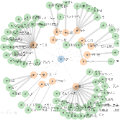Empirical data plays an important role in evolutionary computation research. To make better use of the available data, ontologies have been proposed in the literature to organize their storage in a structured way. However, the full potential of these formal methods to capture our domain knowledge has yet to be demonstrated. In this work, we evaluate a performance prediction model built on top of the extension of the recently proposed OPTION ontology. More specifically, we first extend the OPTION ontology with the vocabulary needed to represent modular black-box optimization algorithms. Then, we use the extended OPTION ontology, to create knowledge graphs with fixed-budget performance data for two modular algorithm frameworks, modCMA, and modDE, for the 24 noiseless BBOB benchmark functions. We build the performance prediction model using a knowledge graph embedding-based methodology. Using a number of different evaluation scenarios, we show that a triple classification approach, a fairly standard predictive modeling task in the context of knowledge graphs, can correctly predict whether a given algorithm instance will be able to achieve a certain target precision for a given problem instance. This approach requires feature representation of algorithms and problems. While the latter is already well developed, we hope that our work will motivate the community to collaborate on appropriate algorithm representations.
翻译:实验性数据在进化计算研究中起着重要作用。 为了更好地利用现有数据,文献中提出了组织其有条不紊的存储方法。 但是,这些正式方法在获取我们域知识方面的全部潜力还有待展示。 在这项工作中,我们评估了一种业绩预测模型,该模型建于最近提议的OPPE 肿瘤学扩展的延伸之上。更具体地说,我们首先扩展了“选择本体学”的词汇,以代表模块化黑盒优化算法。然后,我们使用扩展的“选择本体学”,为两个模块化算法框架,即MdodCMA和modDE, 创建具有固定预算性数据的知识图表,用于24个无噪音的BBBBBB基准功能。我们用基于知识的图形嵌入方法构建了业绩预测模型。我们使用不同的评估设想方案,展示了一种相当标准的预测模型,在知识图表中可以正确预测某个特定算法实例是否能够达到某种目标精确度。这个方法要求以特征来描述我们方算法和方算法的演算方法,而后我们又提出了适当的希望。




